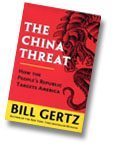 The recent events surrounding the attack on an American surveillance plane by the Chinese have served as a much-needed wakeup call for Americans. It is time to take a serious look at “engagement” and reassess American attitudes toward this communist power.
The recent events surrounding the attack on an American surveillance plane by the Chinese have served as a much-needed wakeup call for Americans. It is time to take a serious look at “engagement” and reassess American attitudes toward this communist power.
The China Threat: How the People’s Republic Targets America by Bill Gertz (Regnery Publishing, Inc., 2000) provides a wealth of chilling details on how the so-called Peoples Republic of China has manipulated the United States into becoming its greatest supporter.
With the end of the Cold War against the Soviet empire, a new optimism overtook America with the belief that communism had died. Gertz’s book provides us with a detailed, balanced, and realistic review of the facts.
We are now in the midst of a new cold war. Red China’s aim is to undermine the perception of itself as a threat so it will have time to develop the strength to achieve its goal of dominating Southeast Asia. If it is victorious in the psychological war with the United States, it will have the technological and financial resources to undermine American influence.
Gertz points out that it is entirely fanciful to believe that the Communist Party of China and the Peoples Liberation Army (PLA) are communist only in name. Since the demise of the Soviet Union, China has become a gravitational pole for communists the world round. Its totalitarian political structure, which exercises complete control over the media and oppresses the Chinese people, is a manifestation of communist doctrine in practice. The communists believe that man is a creature of his environment, hence their disregard for human nature and rights. In classic communist style, their notion of treaties and laws is entirely subject to the interests of the revolution.
What is most alarming about the facts Gertz exposes is the degree to which the P.R.C. has gained fellow travelers in the United States. Michael Oksenberg, a former advisor to President Jimmy Carter’s National Security Council, says: “The Chinese Revolution is an optimistic statement about the capacity of man to solve his problems.… The Chinese dedication to building a more decent just society might also spur us.” Gertz points out that Beijing uses access to key Chinese officials as a method of luring American businessmen and academics into relationships. Their access depends on their advocacy of China’s position.
At the same time, a concerted effort is undertaken to discredit any critic of China to the greatest extent possible. Those who oppose relations with China must come to be viewed as fanatical right-wing McCarthyites. Anti-communism becomes the enemy rather than Red China and its subversion.
Gertz makes it clear that the Chinese view their relationship with the United States as one of warring parties.
Many might have the impression that Chinese strategic development is limited to acquiring technology and building up its weapons for an eventual assault on Taiwan. Such is not the case. China has acquired the use of two important ports in Panama: Cristobal on the Atlantic side of the Panama Canal and Balboa on the Pacific end. With these, China has gained an underground intelligence facility that used to be the U.S. Southern Command facility.
With Red China’s tentacles extending around the world and America’s post-Cold War cutbacks, the Chinese hope to keep the American people and government in a slumber just long enough. They will then be in a position to achieve their goals with a minimum of resistance. Gertz quotes a saying of Chinese philosopher and author of The Art of War, Sun Tzu: “Supreme excellence consists in breaking the enemy’s resistance without fighting.” This is achieved by expanding the notion of war to include initiatives aimed at altering the way Americans think.
China realizes that it will face a “dangerous decade” about 2020, when its build-up will have become too big to ignore. China would have liked “three more decades of Clinton-Gore ‘engagement,’ which downplay Chinese military capabilities, encourage decreasing American defense spending, and give China a major technical and financial boost.”
Meanwhile, their missile buildup continues. The reasons: U.S. business interests, campaign funding, the comfort of an optimistic point of view that allows Americans to ignore an ugly reality. Beyond that, however, Gertz points to a deeper problem, an “ideological affinity for China’s supposedly ‘progressive’ brand of communism” in the previous Administration, which saw China as the “last best hope for the triumph of Marxist ideas.” The new administration does not have this ideological affinity, but the damage has already been done, and a status quo approach is not good enough.
Gertz believes our only hope lies in a change in policy that includes an “intelligence blitz,” a strategic plan, strong alliances with non-communist Asian countries, increasing military forces, and a pro-democracy Pacific community. Without these, China will become the region’s greatest power and perhaps the dominant world power.
The China Threat: How the People’s Republic Targets America
by Bill Gertz
Paperback – 280 pages (2000)
Regnery Publishing, Inc.
ISBN: 0895262819

